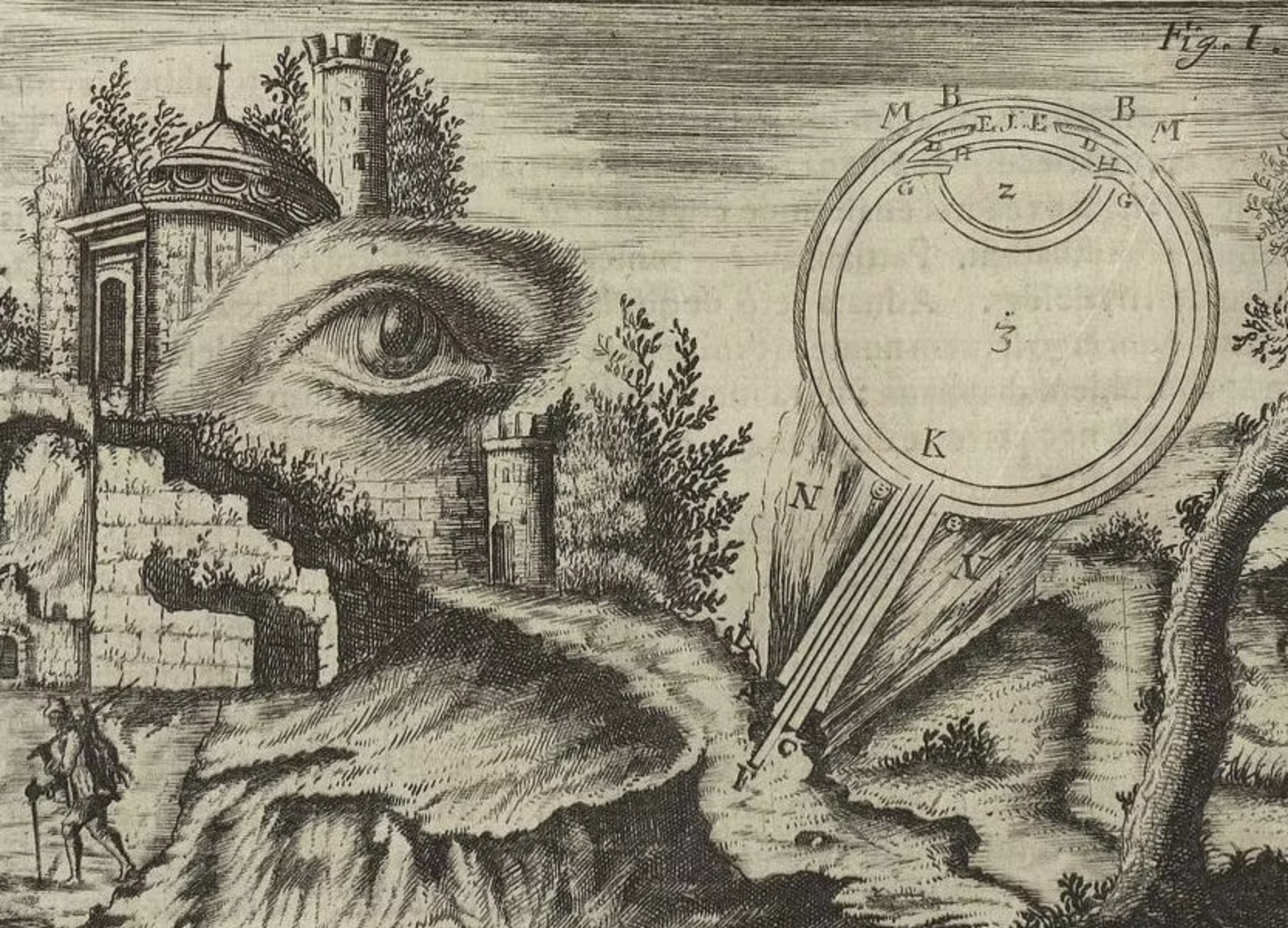Enfolded in Living Reality Pt. 2
Plate from Oculus Artificialis, Johann Zahn. 1685.
Tuukka Toivonen August 19, 2025
Philosophers such as Maurice Merleau-Ponty (1908-1961) warned us decades ago about the folly of viewing reality purely through an analytical or conceptual lens. They were highly critical of the dominance of such “conceived” or analytical perception, or an excessive reliance on abstract concepts, fixed categories and the relentless dissection of phenomena into their constituent parts. For these philosophers, analytical seeing and comprehension was far less than the totality of reality. Instead, they suggested that a continuous, indivisible “lived” perception formed the true ground for all our experience, from the the physical to the cerebral. That perception was the gateway to fully entering the embodied, living reality that always already enfolds us. As society further devalues and grows blind to lived perception and the reality it gives access to, individuals and contemporary organizations not only delude themselves by treating imperfect models of reality as constituting actual reality, they risk distancing themselves from what the ecological thinker and phenomenologist David Abram has called the sensuous world. This deprives us of our very ability to relate to ourselves, other forms of life, and the wider cosmos within which we have always evolved and found profound meaning. As a result, the path to becoming fully human vanishes into thin air.
In the sobering words of philosopher, neuroscientist and psychiatrist Iain McGilchrist, “we live no longer in the presence of the world, but rather in a re-presentation of it”. We designate our abstract concepts, theories, images and other representations as primary and that which is truly present and alive as secondary. In this topsy-turvy rendering of existence, everything is reversed: health metrics, digital content, synthetic voices and scalable “nature-based solutions” come to be seen as more real and preferable than the dynamic and interrelated living wholes that they selectively abstract and exploit.¹ Indeed, in our reductionist fervour,² we have forgotten that complexity and constant change are the norm. Our disconnect mode of thought make it hard to accept this, but intuitively we know that, as McGilchrist puts it, simplicity represents “a special case of complexity, achieved by cleaving off and disregarding almost all of the vast reality that surrounds whatever it is we are for the moment as modelling as simple”.³ The act of simplifying what we experience or hope for does help us cope with our daily lives, but taking artificial representations of reality as truth effectively distorts and devitalizes our existence.
Consider how prioritizing unreal representations at the expense of a directly experienced living reality might manifest in relationships and communications. The relational space has become a site of active algorithmic mediation and intervention, with a rise in people developing intimate connections with chatbots of varying kinds. Consider a scenario where you are facing psychological hardship and long to be listened to, understood and supported, even if you are not (yet) able to expose the heart of the matter. In such a situation, an advanced AI chatbot may well serve as a supportive partner on the face of things, and it may even manage to intelligently unpick many of the root reasons behind your suffering. However, it would still amount to a situation where representations and cognition get treated as primary and where that which is truly alive and present is relegated to a secondary role. What gets devalued and displaced is the presence of another human being who feels your pain, their deeper potential for empathizing, and their simply being there, sharing time with you. In this and many other insidious and subtle ways, distorted takes on what constitutes primary reality have the power to corrupt our experiential fabric and the very foundations of our wellbeing.
Exploring the space between our familiar social realities and the awesome quantum worlds investigated by physicists, I feel that our prevailing assumptions about human reality need to be subjected to a profound test at an earthly level. Although I do not believe our universe is the product of a computer simulation, we have entered a simulated situation all the same by assigning the status of reality almost exclusively to the words, concepts and technologies we have invented rather than to the interconnected, mysterious and experientially rich reality that underpins our existence. This is a trap we cannot easily escape at a collective level, but at an individual level there is a lot that we can do to transcend the limits of our increasingly controlled experiential realities. Spending more time deeply immersed in art, music, meditation and natural environments is one enjoyable way to begin a journey back into living reality. For more ambitious moments, consider open discussions with those around you on which realities we might treat as primary and how we might define the ground upon which new ideas and technologies are to be built. Such engagements might reveal that many of us are much more seriously interested in exploring new ways to “live in the presence of the world” than common representations of our proclivities would have us believe.
Tuukka Toivonen, Ph.D. (Oxon.) is a sociologist interested in ways of being, relating and creating that can help us to reconnect with – and regenerate – the living world. Alongside his academic research, Tuukka works directly with emerging regenerative designers and startups in the creative, material innovation and technology sectors.
¹ This distinction between favouring specific solutions or products rather than the underlying life-giving wholes they are derived from offers a basis for assessing whether an action or enterprise is genuinely regenerative or not.
² McGilchrist traces this overwhelming tendency in contemporary culture back to the way society has systematically over-emphasized and amplified the linear, grasping disposition of the left side of the brain at the expense of the more integrative and holistic orientation of the right hemisphere, owing partly to the preponderance of Cartesian thought and economic ideologies of extraction. McGilchrist has an extensive background in neuroscience research and his work differs decisively with how pop neuroscience and psychology have contrasted the hemispheres and created simplified images of “left-brain” vs “right-brain” thinkers.
³ McGilchrist, I., 2021. The matter with things: Our brains, our delusions, and the unmaking of the world. Perspectiva Press, London, pp. 17-18.

